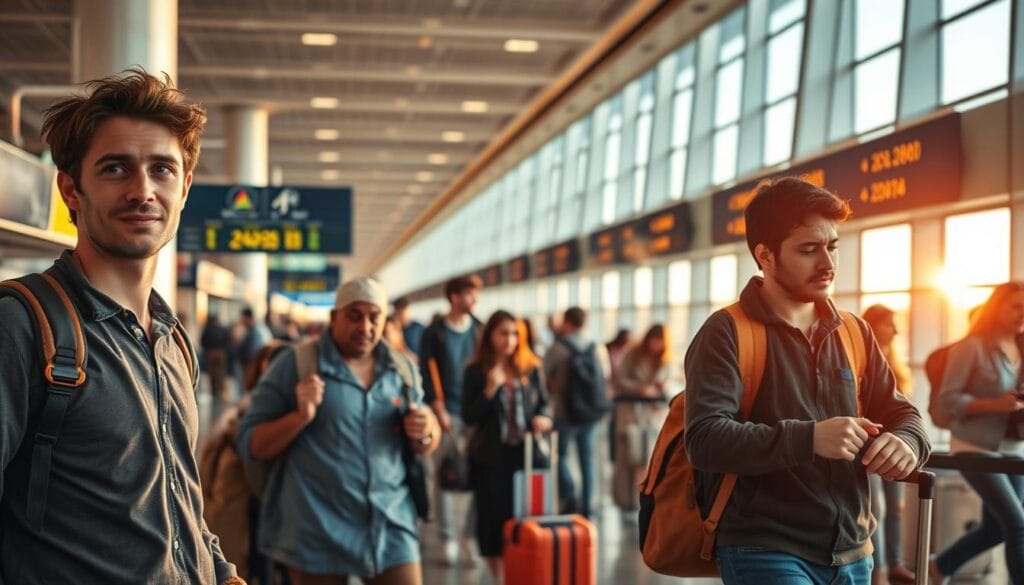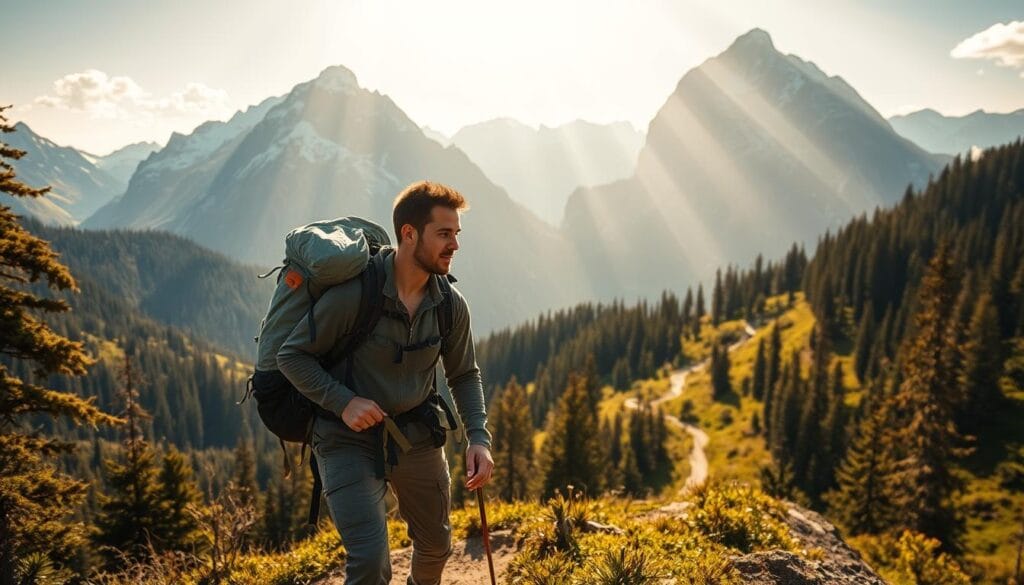Is Traveling a Hobby? Discover the Benefits

Imagine standing at the edge of a cobblestone square in Barcelona. The scent of paella drifts from a nearby stall. Or picture hiking a trail in Yellowstone as sunlight filters through towering pines. These moments are more than just vacations—they’re sparks of a more profound passion.
For many, travel isn’t just a getaway. It’s a way to grow, learn, and connect with the world. But is traveling a hobby? The answer might change how you see your adventures.
Table of Contents
Is Traveling a Hobby or Just a Leisure Activity?
Is traveling a hobby? It depends on how we define it. A hobby means you do it often, get better at it, and put your effort into it. Let’s explore why travel is more than just a vacation.
Defining What Makes Something a Hobby
- Regular participation: Practiced weekly or monthly.
- Skill development: Learning photography, language, or navigation.
- Personal investment: Time and resources dedicated to improving.
- Intrinsic joy: Enjoyment beyond just the outcome.
How Travel Fits the Hobby Definition
Traveling as a holiday hobby means you take action. You might spend months planning trips, learning about local foods, or keeping a travel journal. These efforts help you grow your skills, making each trip a learning experience.
For instance, planning your trip improves your organizational skills. Talking to locals boosts your communication skills.
Separating Casual Travel from a Travel Hobby
Casual travelers take breaks to relax. Hobbyists see travel as a long-term passion. The key difference is in their mindset:
“A hobby isn’t just a break—it’s a pursuit that evolves with you.”
- Casual: Focus on comfort and familiar routines.
- Hobbyist: Prioritizes immersive experiences and growth.
Do you look for new places to explore and learn? If yes, then traveling is a hobby for you. It’s not just a holiday hobby for breaks.
The Psychology Behind Travel as a Passion
Traveling is more than a hobby; it’s a profound urge. Science shows our brains reward curiosity, making wanderlust a powerful force. It shapes our lifelong love for travel.
Why Humans Are Drawn to Exploration
Evolution made humans seek new things. Early humans who explored new lands tended to live longer. Today, your brain gets a dopamine boost when you see something new. This creates a cycle that perpetuates travel.
How Travel Satisfies Our Need for New Experiences
New places challenge us, helping us grow and develop. When you try a new market or learn a language, your brain sees travel as a win. These moments make each trip feel essential.
The Addictive Nature of Wanderlust
Every trip gives you a dopamine rush, making you crave more. It’s like solving a puzzle, where each place is the next clue. This isn’t just a habit; it’s your mind’s way of telling you to explore more.
Benefits of Making Travel Your Hobby
Choosing travel as a hobby changes how you see the world. As a travel enthusiast, you learn skills that go beyond just vacations. Traveling often makes you more adaptable, sharpens your problem-solving, and increases your cultural understanding.
- Personal Growth: Traveling to new places builds resilience. Planning trips teaches you to manage time well. Meeting different cultures boosts empathy.
- Mental Well-being: Research shows travel lowers stress hormones. The joy of upcoming trips makes you happier over time, creating a positive cycle.
- Social Connections: Sharing adventures strengthens friendships. Travel also introduces you to people worldwide, turning strangers into friends for life.
- Knowledge Expansion: Visiting historical sites or markets is like an informal education. You learn about geography, history, and even basic phrases in foreign languages naturally.
Traveling as a hobby also shapes your identity. Each trip adds to your story, helping you discover new passions, such as photography or cooking. Over time, these experiences give you a sense of purpose. Whether you’re hiking or trying street food, every trip enriches your life.
How Travel Hobbyists Differ from Occasional Travelers
Travel hobbyists and occasional travelers have different mindsets. Hobbyists view every trip as an opportunity to learn and grow. They focus on discovery, not just relaxation.

Mindset Differences of Travel Enthusiasts
Travel enthusiasts see challenges as part of the fun. Here’s how they differ:
- They see language barriers as learning chances, not problems.
- They choose authenticity over comfort, seeking real experiences.
- Travel is a big part of their identity, shaping their view of the world.
Planning and Preparation Habits
Hobbyist travelers plan in unique ways. Their habits include:
- They research destinations months ahead, booking trips early.
- They budget carefully, saving for adventures by cutting costs elsewhere.
- They use travel blogs and forums to find hidden spots.
Approach to Experiencing Destinations
Travel hobbyists dive deep into exploration:
- They explore local neighborhoods, not just tourist spots.
- They connect with locals through language or community events.
- They document their trips in journals or photos to remember later.
Developing Your Identity as a Hobbyist Traveler
Starting as a hobbyist traveler is about taking small steps. Set goals, such as planning one trip every three months or learning a new language. These goals make your travels meaningful.
“Identity is built through consistent action. Travel becomes who you are when it’s woven into your decisions daily.” – Adventure Seeker Collective.
- Build rituals: Begin pre-trip routines, such as learning about local customs or using eco-friendly gear.
- Join communities: Connect with online forums or local groups to share tips and get inspired.
- Reflect often: Keep a journal to track your growth and celebrate how travel shapes your view.
Travel should match your life’s priorities. For example, mix work trips with cultural experiences or family vacations that offer both relaxation and adventure. This mindset changes from “I’ll go someday” to “travel is part of me.”
You can begin with small steps: Replace a weekend at home with a 48-hour trip to a nearby town. Each step strengthens your identity as someone who values growth through travel. Over time, these choices change your lifestyle, making wanderlust a lasting part of who you are.
Types of Travel Hobbies and Specializations
Every traveler’s journey is unique. You can dive into local cultures or climb remote peaks. Your passion shapes how you see new places. Choose what excites you most and make travel a lifelong adventure.

Cultural Immersion Travel
Connect with communities around the world. Exploring new places through cultural immersion means:
- Learning local dialects with apps like Rosetta Stone.
- Participating in traditional ceremonies or art workshops.
- Living in homestays to see daily life up close.
Adventure and Outdoor Exploration
Adventure lovers seek physical challenges. Activities like trekking in Patagonia or kayaking in Norway require skill:
- Training with certified guides for rock climbing.
- Joining clubs like The Access Fund for safety advice.
- Tracking your journey with apps like AllTrails.
Culinary Tourism
Make meals into lessons. Food-focused travelers:
- Take pasta-making classes in Bologna.
- Explore markets like Bangkok’s Chatuchak.
- Find hidden gems with apps like Foursquare.
Historical and Heritage Travel
Discover history’s stories. Visit:
- UNESCO World Heritage Sites like Petra or Angkor Wat.
- Guided tours at ancient ruins with archaeologists.
- Local museums with historical novels for background.
Your niche shapes your worldview. Whether you seek thrills or flavors, focusing on something special makes travel rich and rewarding.
Building Skills as a Travel Hobbyist
To become a skilled travel hobbyist, you need to learn practical skills. These skills make exploring new places more rewarding. Whether it’s mastering maps or capturing memories, these abilities make your trips more meaningful.
Learn also: How to Easily Make Friends in a New City
Navigation and Orientation Skills
Start by learning to read topographic maps and use GPS devices—practice using apps like Google Maps or AllTrails to understand landmarks and transit systems. For more practice, try orienteering challenges or night navigation drills.
- Learn compass basics and grid references
- Test routes in familiar areas before applying skills abroad
- Master public transport schedules and signage systems
Cultural Adaptation Abilities
Start by learning key phrases in local languages with apps like Duolingo. Study regional etiquette guides and practice adapting to different social norms. Courses from platforms like Coursera can help you understand global customs better.
Photography and Documentation Techniques
Use the rule of thirds and natural lighting to capture compelling travel stories. Consider investing in a mirrorless camera or mastering smartphone photography with apps like Lightroom. Combine visuals with written journals or video blogs to document your travels.
“The best travel enthusiasts turn every journey into a learning lab for improvement.”
Developing these skills creates a cycle of growth. Every trip becomes a chance to improve and grow as a seasoned travel hobbyist.
Financial Aspects of Maintaining Travel as a Hobby
Turning travel into a lasting hobby requires careful financial planning. Instead of wondering if you can afford a trip, plan how to make travel a regular part of your life. You can begin by setting aside a certain percentage of your income for travel. Many people use automatic transfers to a unique travel account each month.
This method makes travel a regular part of your budget, not just a last-minute expense.
- Percentage-based savings (e.g., 10% of income)
- Automated transfers to a travel-specific account
- Opportunity cost analysis to prioritize spending choices
Use loyalty programs and travel credit cards to get more value. Cards with travel rewards or airport lounge access can save money. Use apps like The Points Guy to track and use your points wisely.
Travel budgets vary based on your style. Budget travelers might stay in hostels and use public transport. Those who prefer luxury might save more. For example, saving 10% of $50k can fund 2–3 trips a year.
Get creative with your budget. Stay for free by house sitting or volunteering. Travel during the off-season to save money. Choose countries with lower costs to stretch your budget further.
See travel as an investment in yourself. Skills like cultural adaptation or photography can boost your career. Traveling abroad can also open up new job opportunities. A 2023 study by Nomad List showed 45% of digital nomads found clients through their travels.
Whether you’re saving for a holiday, a hobby, or long-term adventures, planning is key. Start small: saving $50 a month adds up to $600 a year. With these tips, is traveling a hobby? It can be a fulfilling and sustainable lifestyle.
Combining Travel with Other Hobbies and Interests
For those with a love for travel, mixing your journey with other passions makes it more prosperous. Whether you love art, writing, or collecting, combining hobbies with travel deepens your connection to new places. Let’s see how to make trips into complete adventures.
Photography and Travel
Take a camera to turn sightseeing into stories. Snap landscapes, street scenes, or local markets. Tips: Use a light DSLR or apps like Lightroom. Share festival photos or architecture on Instagram or in scrapbooks.
Writing and Blogging About Your Travels
Make your trips into written stories. Start a blog on WordPress or Medium. Share food stories, cultural insights, or unique itineraries. Writing sharpens your observation skills—note local dialects or street food stalls. Blogs connect you with travelers around the world.
Collecting Souvenirs and Mementos
Build collections that show your travel passion. Collect postcards, vintage maps, or traditional crafts. Display them in shadowboxes or digital albums to relive memories. A spice jar from Morocco or a hand-painted plate from Mexico tells a story.
Whether you mix travel with art, words, or collections, each blend adds depth to your experiences. Try different combinations to find what works best for you. Your next trip could become a canvas for creativity or a chapter in your life story.
Resources for the Dedicated Travel Enthusiast
For those who love to travel, the right tools can make every trip memorable. Start with apps that help you dive deeper into local cultures. Try Duolingo for languages or Culture Trip’s blogs for cultural insights.
Also, consider subscription services like Rough Guides or Fodor’s. They offer itineraries that match your interests.

“Wanderlust isn’t just a feeling—it’s a mindset shaped by knowledge and community.”
- Online Communities: Join forums like The Manifold Greatness or Reddit’s r/travelplanning to connect with fellow travelers.
- Reading Lists: Explore classics like Paul Theroux’s “The Great Railway Bazaar” or modern guides like “The Places in Between” by Rory Stewart.
- Learning Platforms: Enroll in Coursera’s “Cultural Anthropology for Travelers” or language courses on Babbel.
- Membership Groups: Explore National Geographic Traveler’s membership for exclusive destination insights, or join local travel clubs like the Adventure Travel Trade Association.
Use tools like Ethical Traveler’s sustainability guides or apps like TripIt for planning. Etsy has travel journals for documenting your trips. Choose resources that match your wanderlust goals, like history, ecology, or cuisine, to create your own travel toolkit.
Conclusion: Embracing the Journey as Your Lifelong Hobby
Is traveling a hobby? Absolutely. It’s a passion that grows with you. Travel isn’t just about seeing sights; it’s about learning on the go.
Whether you’re exploring cultures or hiking trails, travel turns trips into adventures. This hobby helps you grow mentally and connect with others. It shapes who you are.
Your travel hobby changes as life does. Families can find places for kids, while retirees enjoy slower travel. The important thing is to keep curious, no matter what.
Don’t let budgets or schedules hold you back. Use apps like Google Trips for affordable plans. Weekend trips keep the excitement alive.
Start today by booking a trip or joining travel groups online. Share your stories and photos on social media. Building a travel passion makes every journey a part of your life story. Travel isn’t just a hobby; it’s a way to live fully.
FAQ
Is traveling a hobby or just a leisure activity?
Traveling can be a hobby if you love exploring new places and cultures. It’s more than just taking vacations. If you enjoy planning trips and learning new things, it becomes a rewarding hobby.
How do I know if I am a travel hobbyist?
You might be a travel hobbyist if you seek out new places and enjoy planning trips. If travel is a big part of who you are, you’re likely passionate about it.
What psychological benefits does travel as a hobby provide?
Traveling can make you feel less stressed and broaden your views. It satisfies your curiosity and helps you grow. You’ll learn about different cultures and environments.
How can I develop my skills as a travel hobbyist?
To improve, learn navigation, adapt to new cultures, and take better photos. Workshops and online courses can provide valuable insights into travel.
What are some different types of travel hobbies I can explore?
You can dive into cultural immersion, adventure, food tours, or historical tours. Focus on what interests you most to make your travel more meaningful.
How do I balance travel with my financial responsibilities?
Manage your finances by budgeting for travel and saving. See travel as an investment in your experiences. This way, you can plan more effectively and spend your money wisely.
Can travel be combined with other hobbies?
Yes! Combining hobbies like photography, writing, or collecting can enrich your travels. It makes your experiences more fulfilling and personal.
Where can I find resources to enhance my travel hobby?
There are many resources for travel lovers, like apps, online groups, books, and workshops. These can help you improve your travel skills and plan better.
How can I transition from being an occasional traveler to a dedicated hobbyist?
To become a dedicated travel enthusiast, change the way you view travel. Set goals, join travel communities, and see travel as a key part of your life. This will deepen your love for it.

